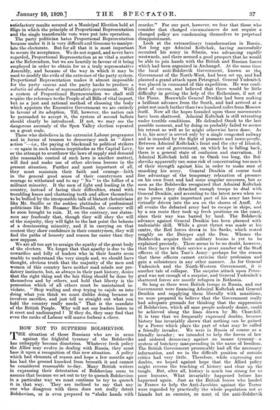HOW NOT TO SUPPRESS BOLSHEVISM.
THE situation of those Russians who are in arms against the frightful tyranny of the Bolsheviks has unhappily become disastrous. Whatever fresh policy the Allies may evolve in dealing with Russia, they must base it upon a recognition of this new situation. A policy which had elements of reason and hope a few months ago has had the *ground knocked from beneath it and cannot be considered reasonable to-day. Many British writers in expressing their detestation of Bolshevism seem to assume that because we set out to try to quench Bolshevism in a particular way we must continue to try to quench it in that way. They are inclined to say that any one who disagrees with them does not really detest Bolshevism, or is even prepared to "shake hands with murder." For our part, however, we fear that those who consider that changed circumstances do not require a changed policy are condemning themselves to perpetual disappointment.
Look at the extraordinary transformation in Russia. Not long ago Admiral Koltchak, having successfully recruited his army in Siberia, was advancing rapidly westwards, and there seemed a good prospect that he would be able to join hands with the British and Russian forces which had been organized in Archangel. At the same time the local anti-Bolshevik Government, known as thq Government of the North-West, had been set up, and had planned a grand attack upon Petrograd. General Yudenitch was placed in command of this expedition. He was confi- dent of success, and believed that there would be little difficulty in getting the help of the Esthonians, if not of the Finns. Meanwhile General Denikin had been making a brilliant advance from the South, and had arrived at a point not much further than two hundred miles from Moscow itself. Now all the hopes founded upon those movements have been shattered. Admiral Koltchak is still retreating under terrible conditions. He defended Omsk to the last possible moment, and by doing so probably failed to secure his retreat as well as he might otherwise have done. As it is, his army is served only by a single congested railway and is impeded by the flight of peasants and townspeople. Between Admiral Koltchak's front and the city of Irkutsk, his new seat of government, on which he is falling back, there is a general state of confusion and starvation. If Admiral Koltchak held on to Omsk too long, the Bol- sheviks apparently ran some risk of concentrating too much of their strength against him in order to make sure of smashing his army. General Denikin of course took fine advantage of the temporary relaxation of pressure on his own front and had some singular successes, but as soon as the Bolsheviks recognized that Admiral Koltchak was broken they detached enough troops to deal with General Denikin, and according to the latest news when we go to press a quite important part of his army has been virtually driven into the sea on the shores of Azoff. At all events the defeated army had to escape in ships, and by a sea route they took up fresh positions on the coast, since their way was barred by land. The Bolshevik advance against General Denikin has been planned with undeniable skill. While a great thrust was made at his centre, the Red forces drove in his flanks, which rested roughly on the Dnieper and the Don. Whence the Bolsheviks acquire their military brains is yet to be explained precisely. There seems to be no doubt, however, that they have hi their service a great number of the Staff officers of the late Tsar's Army—perhaps for the reason that these officers cannot exercise their profession and gain a subsistence in any other manner. As for General Yudenitch and the North-Western Government, it is another tale of collapse. The surprise attack upon Petro- grad was not enough of a surprise, and General Yudenitch's shattered forces are mostly refugees in Esthonia.
So long as there were British troops in Russia, and our Government were financing Admiral Koltchak and General Denikin and supplying them liberally with munitions, we were prepared to believe that the Government really had adequate grounds for thinking that the suppression of Bolshevism, which all sane people ardently desire, could be achieved along the lines drawn by Mr. Churchill. It is true that we frequently expressed doubts, because history has invariably shown that nothing can be gained by a Power which plays the part of what may be called a friendly invader. We were in Russia of course as a friendly invader ; we intended to help the forces of law and ordered democracy against an insane tyranny—a system of butchery masquerading in the name of freedom. The British Government presumably had all the necessary information, and we in the difficult position of outside critics had very little. Therefore, while expressing our doubts, we hoped against hope that the Allied policy might reverse the teaching of history and clear up the tangle. But, after all, history is much too strong for us poor humans. What invariably happened before has happened again. Just as the British forces who landed in France to help the Anti-Jacobins against the Terror were regarded by practically the whole population not as friends but as enemies, so most of the anti-Bolshevik Russians have suspected our motives from the beginning, and the intervention of the Allies, so far as we can judge, tended to fortify rather than to weaken the Bolsheviks. We acted on the assumption, for example, that the Baltic States—Esthonia and the rest—would necessarily approve of our policy. How could they fail to wish success to Admiral Koltchak and General Denikin and General Yudenitch in their attempt to overthrow the bloodstained rule of the Bolsheviks ? Nevertheless, strange or perverse though it may seem, these Baltio peoples do not approve of the Allied policy. Consider the case of Esthonia. This State has set up a Coalition Government of a moderate complexion, and is apparently developing an orderly Administration which has every chance of being accepted contentedly by the Esthonian people. Although the British people could hardly understand the reluctance of the Esthonians to co-operate with General Yudenitch, and thus to help forward the Allied policy, which was conceived in the interests of the Esthonians as much as in the interests of anybody, yet it was, and is, natural enough for the Esthonians to regard Admiral Koltchak and his friends with only a lesser degree of suspicion than that with which they regard the odious Bolsheviks. They think of Admiral Koltchak- though they may be quite 'wrong in doing so—as a re- actionary who, if ever he were able to do so, would certainly restore the autocracy. If you ask for a proof of this belief, they say that it obviously must be so, because when they asked for recognition of the independence of the EsthonianRepublic Admiral Koltehak and General Denikin absolutely refused to grant that recognition but preached the virtues of an indivisible Russia. If the Esthonians, who have had ample opportunities of examining the policy of the Allies, and who admit its good intentions, believe that the leaders of the White forces in Russia are really reactionaries, how much more must this be believed by the rank-and-file in the Bolshevik armies ? Here is a startling illustration of how the friendliest sort of intervention works in practice. No doubt hundreds of thousands of Bolshevik soldiers remain under arms just because they think that the old autocracy is to be thrust upon them again from the outside. The fact that the rule of the Tsar was infinitely preferable to Bolshevism does not weigh with them in the least. They stubbornly refuse to be dictated to in any case. The present policy, of the Allies is that, as the ultimate. success of Admiral Koltchak and General Denikin need not be despaired of, it is necessary to join with them in refusing reeognition to Esthonia. It is thought that if Esthonia should actually make peace with the Bolsheviks, the whole plan of containing Bolshevik Russia by means of a cordon of anti-Bolshevik countries would break down. It is at this point that• we find ourselves unable to believe in the policy of the Allies. We quite see the logic of the cordon sanitaire ; but what if the members of that cordon maintain the line against their will, or at all events with a grievance in their hearts which would make them untrust- worthy warders Unless the members of the cordon are in good political health, the cordon is not likely to be " sanitaire " after all. The best barrier to Bolshevism is a string of prosperous States without grievances. At present the Esthonians have a grievance against us because we will not recognize their Republic.
We have taken the Esthonians as a type of the rest because they have been the first to enter into peace negotia- tions with the Bolsheviks. Their case is that they could not hold out against the Bolsheviks any longer, as a very small proportion of the money and munitions sent to Russia was allocated to them. The best kind of cordon to set round the Bolsheviks, we repeat, is a series of States which will be a vivid example of what happy lives can be led by those who are not Bolsheviks. It has been estimated that, among those who are fighting for the Bolsheviks or otherwise actively serving the Bolshevik Government, only about 15 per cent. are really Bolsheviks. The rest would be glad to see the fall of a horrible system. If this be so, the 85 per cent. could more easily be detached from their nominal allegiance to the Bolsheviks if they could point to thriving non-Bolshevik communities within the borders of what used to be Russia. If the independence of Esthonia were recognized, Latvia, Lithuania, and Finland would probably all desire to follow suit, and become parts of the cordon of their own volition instead of as the pawns of an imposed policy. We have given a good trial to intervention, and it has failed. Now let us be wiser, more attentive to history, and frame a policy in which generous sympathy with non-Bolshevik Russians is compatible with non-intervention. British Ministers have several times stated that all that the Baltic peoples ask for is really granted, since the Baltic States are quite free to decide their own future. That may be true in the letter, but it is not true in the spirit. The Esthonians declare that they have in effect been threatened with the dis- favour of the French Government if they do venture to decide what is best for themselves.



































 Previous page
Previous page